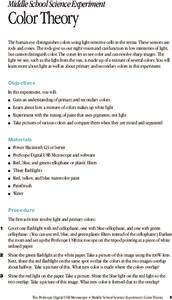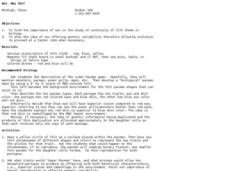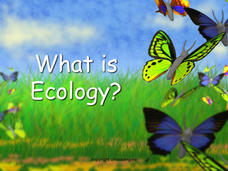Curated OER
Coloring Fabrics With Dyes from Plant Materials K-12 Experiments & Background Information
Students investigate the effects of acid and bases on dyes made with plant materials. For this chromatography lesson students predict color outcomes and complete a lab activity on color combinations.
Curated OER
Alternate Theory of Color Perception
Students use the color wheel, matches, masking tape, and slides to view an alternate theory of color perception. In this color perception lesson plan, students discuss the different theories and processors.
Curated OER
Color Theory
Students are able to gain an understanding of primary and secondary colors. They are able to explore about how a mixture of colors makes up white light. Students are able to experiment with the mixing of paint that uses pigments, not...
Colorado State University
Why Are Clouds White?
Is it possible to change the color of clouds? A three-part activity explores the scattering of light by the water droplets that make up clouds. After observing a demonstration, curious scholars conduct their own investigations of the...
Curated OER
THE MANY COLORS OF SUNLIGHT
Students examine rainbow components, spectral colors, colors perceived by the eye, hot solids, glowing rarefied gas, absorption, that light is a wave, and optics.
Curated OER
A Model for Natural Selection- Spaghetti Worms
Does the early bird really get the worm? If so, which color of worm does it prefer? In an exciting and easy week-long field investigation, young field biologists set up a one square meter feeding area for birds. If you have a webcam,...
Curated OER
Kinetic Theory
Young scholars describe how molecules of the different phases of matter move according to the Kinetic Theory. In this chemistry lesson, students observe and participate in teacher demos. They give real world applications of the kinetic...
Curated OER
Unit 3 Cell Structures: Cell Theory & Organelles
Students examine cell structures in depth. They decide what grade they want to work for and do the assignments for that grade. They complete various assignments on cell theory and organelles.
University of Pennsylvania
Evolution by Natural Selection
A diagram, data table, and reading passage top this resource. Through it, biology beginners are introduced to the concept of natural selection. They answer some questions and then participate in a simulation using fabric as a habitat and...
Curated OER
But, Why Sex?
Learners investigate the importance of sexual reproduction in evolution. In this sexual reproduction lesson plan, students simulate species with two traits: eye and skin color. They determine what characteristics are beneficial for the...
Curated OER
They're more evolved that way
Students explore the notion of local evolution, or genetic selectivity among different continent-based human populations. They consider specific examples of local evolution, such as lactose tolerance, skin color, and cognitive capacity,...
Curated OER
The Big Bang Theory
Learners explore the Big Bang Theory and discover how it can be used to explain the origin of the universe. For this Big Bang Theory lesson, students use a balloon with colored paper inside, blow it up and pop it, group the colored...
Curated OER
Alchemists' Theory of the Elements
In this alchemy worksheet, learners read about the early thoughts of alchemists regarding elements. Students are given an experiment done by an alchemist during the Middle Ages and they answer three questions about the experiment knowing...
Curated OER
Natural Selection
Students comprehend that natural selectionis the tool for adaptation and evolution of populations. They pick three M&M's and no candy corns. Students tally the number of different color M&M's chosen. They discuss why colors...
Curated OER
Colors
Students learn about the Impressionist painters' use of color and how it connected to early nineteenth century scientific theories about color. For this colors lesson plan, students explore combinations of primary and secondary colors,...
Curated OER
Adaptation and Mimicry - Biology
Young scholars compare and contrast adaptations involving camouflage, warning coloration, and mimicry. They explain the relationship between adaptation and ability for survival and reproduction. Students define Batesian and Mullerian...
Curated OER
Cells & Their Function
Students review cell theory, identify major organelles found in typical cell, describe function of each major organelle, compare plant and animal cells, and demostrate understanding that cancer is caused by uncontrolled division of cells.
Curated OER
Mimicry: An Example of Adaptation
Learners are able to explain the relationship between adaptation and ability for survival and reproduction. They are able to give examples of a series of adaptations that would support the idea that evolution is a series of minor...
Curated OER
Evolution Lab
Students examine the pattern of natural variation in a society. They examine Darwin's theory of evolution and analyze data. They use computer programs to graphically display the variation in organisms.
Curated OER
The Peppered Moth
In this evolution worksheet, students read about the changes the peppered moth went through over 100 year time period. Students complete 3 short answer questions based on what they read.
Curated OER
Wild Kingdom
High schoolers research and discuss the natural habitats and various evolutionary theories of giraffes and other animals imported into ancient Rome.
Curated OER
Sedimentary Structures- An Adventure in Painting and Collage
Pupils identify and interpret concepts about how the Earth was formed and convey some of these ideas in a painting.
Students experiment with different types of paints and paint applicators to achieve a variety of visual textures....
Curated OER
(S-4) The Many Colors of Sunlight
Students observe and explore the characteristics of light.
Biology Junction
What Is Ecology?
Do you know the name for the biological study of interactions? A short presentation with accompanying worksheet introduces individuals to ecology. The materials offer a broad overview of the subject and the levels of organization to...























